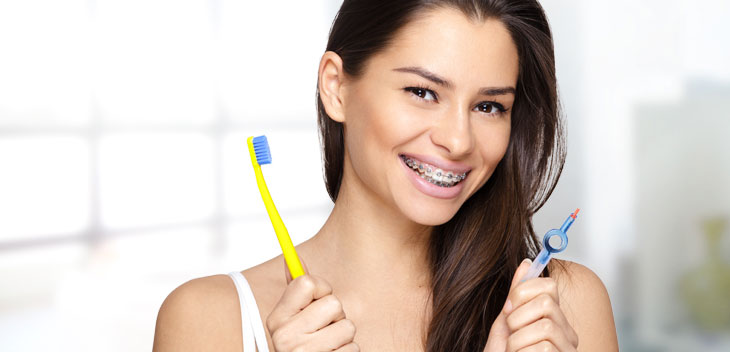If you didn’t know much about dental hygiene before getting braces, now is the time to get serious. Braces require a little bit of extra care on the part of the wearer, and the better you take care of them, the more comfortable and effective your treatment will be. Check out our tips for how to take care of braces.
Brush after every meal
If you’re going to pay attention to just one of these braces care tips, make it this one! Because plaque and food particles can become trapped in your braces, it’s especially important for orthodontic patients to take extra special care of their teeth. If you don’t, potential outcomes include swollen gums, cavities, permanent white marks on your teeth, bad breath, and even gum disease. Here’s how to brush teeth with braces:
- First, remove the bands, elastics, and any other parts of your braces which can be removed.
- Then, clean the braces themselves, brushing from top to bottom around the wires and pins.
- Next, brush your teeth. You should brush for around 2 minutes after every meal, as well as before bed.
- Rinse thoroughly and check your mouth to see whether any food particles were missed.
Get your floss on
Flossing is a crucial part of your orthodontic treatment, so before you say very loudly to your dentist, “But I don’t like flossing!” just remember that this isn’t a negotiable part of the deal. You have to floss at least once a day, because brushing alone can’t get rid of all the plaque in your mouth. Plus, your risk of plaque increases when you start wearing braces. Remember to use flossing materials that were specially designed for orthodontic care, such as floss threaders. Here are some more of our top tips for giving your teeth the floss they really deserve!
- Take around 18 inches of floss and wind most of it around your middle fingers.
- Hold around 2 inches of floss between your middle fingers and feed it between the main archwire and the part of your tooth which is nearest the gum.
- Use a sawing motion to follow the curve of your teeth up to the gum line.
- When moving around the archwire, be careful not to use too much force.
Fix up broken braces
Sometimes, braces can get damaged, but if you take the right action, it’s not the end of the world. Protruding or broken wires can be a problem, so before contacting your orthodontist, try to push the wire into a position that will stop it from poking the inside of your mouth. Then, add some orthodontic wax for a bit of extra protection (your orthodontist will probably give you a pack of this stuff after you first get your braces put in). If your brackets or bands become loose, you should get in touch with your orthodontist and schedule an appointment as soon as possible.
Top braces care tips
Learning how to take care of braces is probably a brand new experience for you, so we put together a quick guide to some of the simplest do’s and don’ts for braces.
Do…
- Rinse after eating. You know the story: you’ve given into temptation and enjoyed a sugary drink, and now you need to brush your teeth, pronto. But you’re nowhere near your toothbrush. Don’t worry, rinsing your mouth out with water can tide you over until you get to your toothbrush. Swish it around for about 30 seconds to get rid of food particles and reduce the decay-causing acidity left in your mouth.
- Use specialist braces equipment. If you’re learning how to take care of braces, give yourself the right tools for success. The ADA recommends fluoride toothpaste, preferably one which contains the ADA Seal of Acceptance. You should also try to use an interproximal brush, which is great for removing food that gets stuck between your archwire and your teeth. Finally, water irrigators can be a great investment. Use these to flush food particles from your mouth.
Don’t…
- Forget to wash your retainer. Once a day—or at the very least, once a week—disinfect your retainer with a denture cleanser. Simply pop the retainer in a cup of warm water which contains the cleanser and allow it to soak for about 20 minutes. Make sure that you rinse your retainer with water before placing it back in your mouth.
- Leave your braces unprotected. Playing sports while wearing braces is no problem, but doing so without some extra protection might be. For contact sports like basketball, football, and martial arts, use a mouthguard on both the top and bottom teeth for comprehensive protection.
For more information on how to care for braces, talk to an orthodontist!
Medically reviewed by Dr. Natalie Pennington, DDS, March 2019

